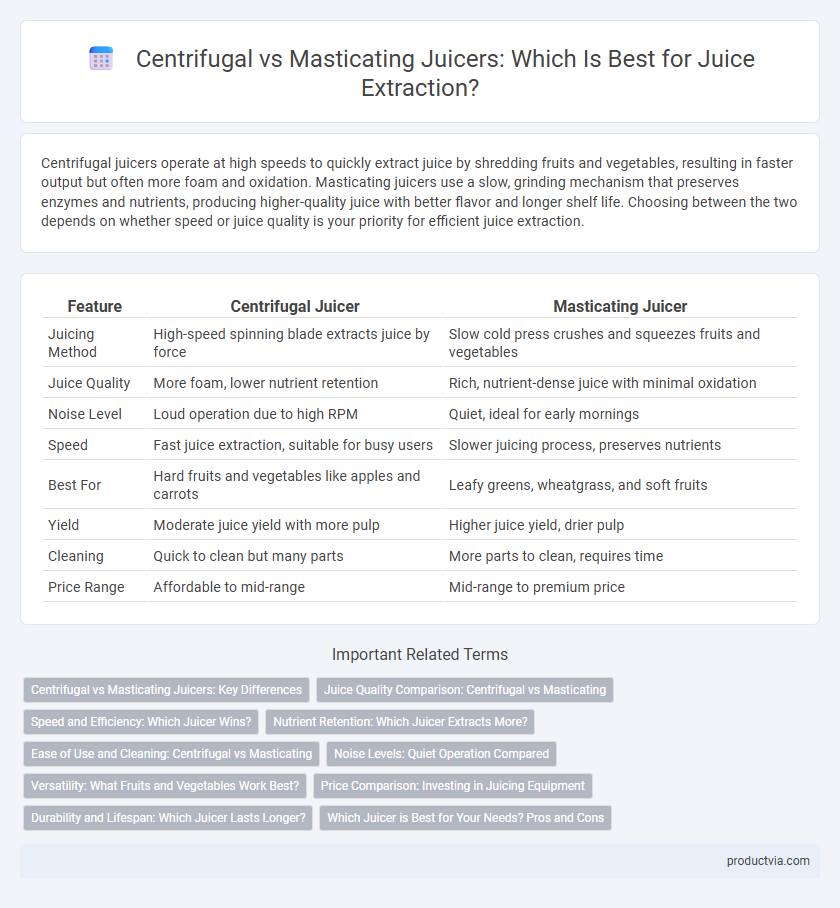Centrifugal juicers operate at high speeds to quickly extract juice by shredding fruits and vegetables, resulting in faster output but often more foam and oxidation. Masticating juicers use a slow, grinding mechanism that preserves enzymes and nutrients, producing higher-quality juice with better flavor and longer shelf life. Choosing between the two depends on whether speed or juice quality is your priority for efficient juice extraction.
Table of Comparison
| Feature | Centrifugal Juicer | Masticating Juicer |
|---|---|---|
| Juicing Method | High-speed spinning blade extracts juice by force | Slow cold press crushes and squeezes fruits and vegetables |
| Juice Quality | More foam, lower nutrient retention | Rich, nutrient-dense juice with minimal oxidation |
| Noise Level | Loud operation due to high RPM | Quiet, ideal for early mornings |
| Speed | Fast juice extraction, suitable for busy users | Slower juicing process, preserves nutrients |
| Best For | Hard fruits and vegetables like apples and carrots | Leafy greens, wheatgrass, and soft fruits |
| Yield | Moderate juice yield with more pulp | Higher juice yield, drier pulp |
| Cleaning | Quick to clean but many parts | More parts to clean, requires time |
| Price Range | Affordable to mid-range | Mid-range to premium price |
Centrifugal vs Masticating Juicers: Key Differences
Centrifugal juicers operate at high speeds using a rapidly spinning blade to shred fruits and vegetables, resulting in quick juice extraction but with increased oxidation and lower nutrient retention. Masticating juicers, also known as slow or cold press juicers, crush and press produce at low speeds, preserving more enzymes and nutrients while producing juice with less foam and longer shelf life. The choice between centrifugal and masticating juicers depends on priorities such as juice quality, extraction speed, and noise level, with masticating models generally favored for nutrient preservation and centrifugal models valued for convenience and speed.
Juice Quality Comparison: Centrifugal vs Masticating
Centrifugal juicers operate at high speeds, which can cause heat buildup and oxidation, potentially reducing nutrient retention and juice freshness. Masticating juicers use a slow, cold-press mechanism that preserves enzymes, vitamins, and minerals, resulting in higher quality juice with better flavor and longer shelf life. Studies show masticating juice maintains significantly more antioxidants compared to centrifugal juice due to minimal heat and oxygen exposure during extraction.
Speed and Efficiency: Which Juicer Wins?
Centrifugal juicers excel in speed, extracting juice in under a minute by rapidly spinning blades to shred fruits and vegetables, making them ideal for quick juice preparation. Masticating juicers operate slower, around 30 to 60 RPM, using an auger to crush and press produce, enhancing juice yield and nutrient retention but requiring more time. For pure speed, centrifugal juicers win, while masticating juicers offer superior efficiency in juice extraction and quality.
Nutrient Retention: Which Juicer Extracts More?
Masticating juicers extract juice by slowly crushing and pressing fruits and vegetables, preserving higher levels of vitamins, enzymes, and antioxidants due to minimal heat and oxidation. Centrifugal juicers operate at high speeds, generating heat and exposing juice to more oxygen, which can degrade nutrient content and reduce enzyme activity. For optimal nutrient retention, masticating juicers are generally the superior choice, maintaining freshness and maximizing health benefits.
Ease of Use and Cleaning: Centrifugal vs Masticating
Centrifugal juicers excel in ease of use with their straightforward assembly and rapid juice extraction, making them ideal for quick morning routines. Masticating juicers, while requiring more parts and a longer cleaning time due to slower, grinding extraction, offer superior juice yield and nutrient retention. Cleaning centrifugal models typically involves rinsing large, fewer components, whereas masticating juicers demand thorough scrubbing of multiple small parts to maintain optimal performance.
Noise Levels: Quiet Operation Compared
Centrifugal juicers typically operate at higher speeds, producing noise levels around 80-100 decibels, which can be disruptive in a home environment. Masticating juicers work at slower speeds, often below 60 decibels, ensuring a quieter and more peaceful juice extraction process. For noise-sensitive users, masticating juicers offer a significantly quieter operation compared to the louder centrifugal models.
Versatility: What Fruits and Vegetables Work Best?
Centrifugal juicers excel at quickly processing hard fruits and vegetables like apples, carrots, and beets, making them ideal for those seeking fast juice extraction. Masticating juicers handle a wider variety of produce, including leafy greens, wheatgrass, and soft fruits such as berries and grapes, offering greater versatility in juice combinations. Choosing between these juicer types depends on the range of fruits and vegetables you plan to use regularly for optimal nutrient retention and juice yield.
Price Comparison: Investing in Juicing Equipment
Centrifugal juicers typically cost between $50 and $150, making them a budget-friendly option for quick juice extraction. Masticating juicers range from $200 to $500, reflecting their slower, nutrient-preserving cold-press technology. Investing in a masticating juicer offers higher juice yield and longevity, justifying the upfront cost for health enthusiasts and frequent users.
Durability and Lifespan: Which Juicer Lasts Longer?
Centrifugal juicers typically have a shorter lifespan due to their high-speed motor and multiple moving parts that wear out faster under frequent use. Masticating juicers feature slower, more efficient motors with fewer mechanical stresses, contributing to greater durability and extended durability spans often exceeding a decade. Investing in a masticating juicer generally results in a longer-lasting appliance, especially for regular juice extraction applications.
Which Juicer is Best for Your Needs? Pros and Cons
Centrifugal juicers excel in speed and affordability, making them ideal for users seeking quick juice extraction from hard fruits and vegetables, but they often produce less nutrient-rich juice due to heat and oxidation. Masticating juicers operate at slower speeds, preserving more enzymes and nutrients by gently crushing produce, making them suitable for leafy greens and wheatgrass, though they come with a higher price and longer juicing time. Choosing the best juicer depends on your priorities: fast extraction and budget for centrifugal, or nutrient retention and versatility for masticating.
Centrifugal juicer vs Masticating juicer for juice extraction Infographic

 productvia.com
productvia.com